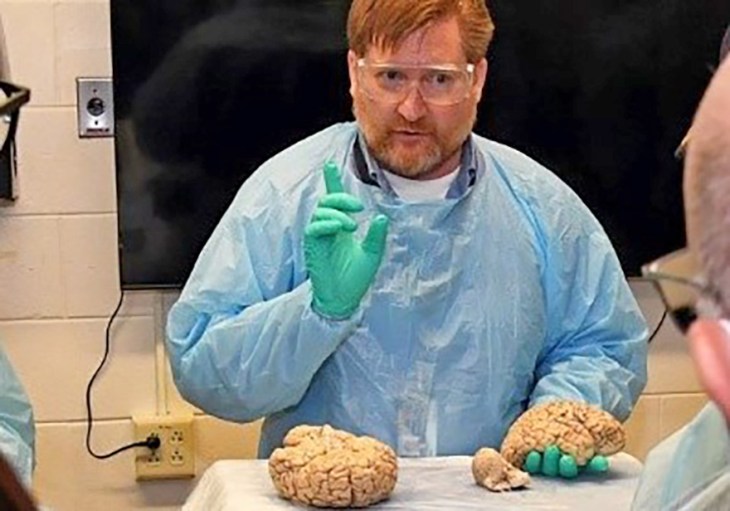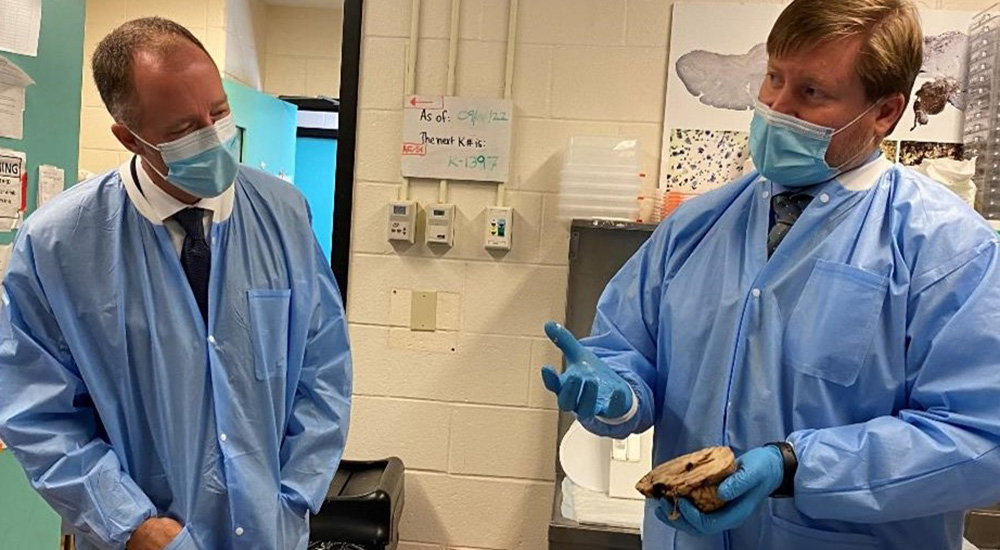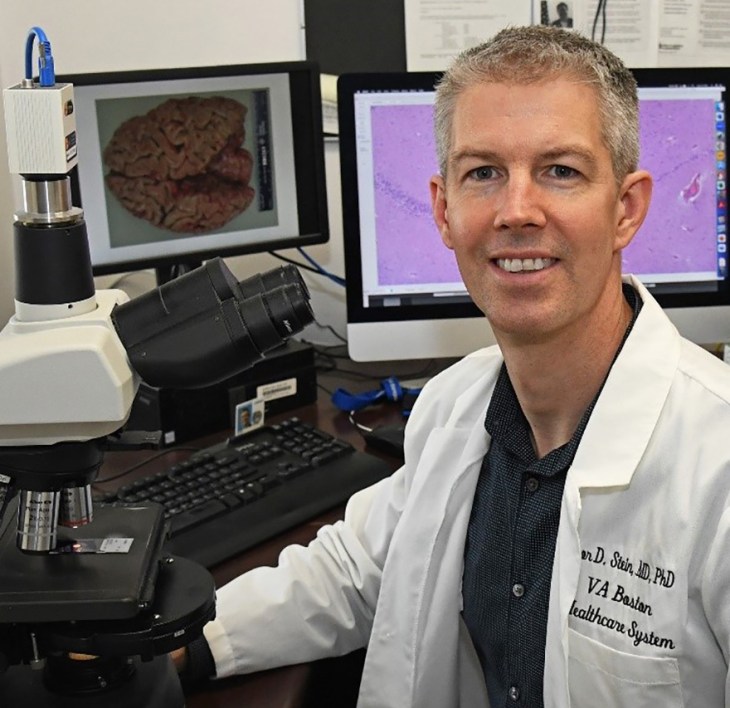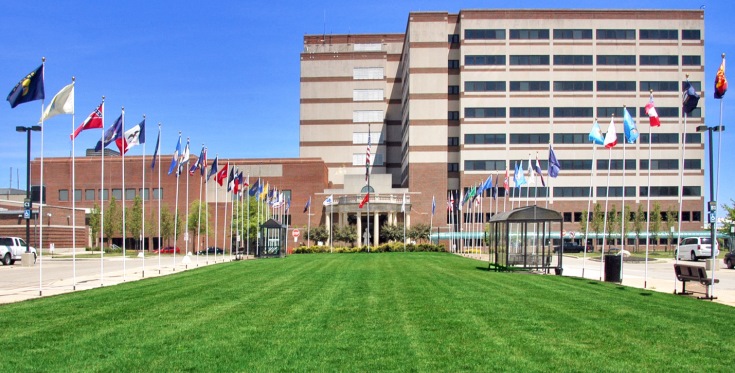The VA Biorepository Brain Bank (VABBB) in Boston is a human tissue bank that collects, processes, stores and gives out research specimens for future scientific studies.
The VABBB provides central nervous system tissue and health information to scientists studying disorders such as amyotrophic lateral sclerosis (ALS, Lou Gehrig’s disease), disorders of Veterans of the 1990-91 Gulf War and posttraumatic stress disorder (PTSD).
Pictured above, VISN 1 Network Director Ryan Lilly (left) gets a briefing from Dr. Russ Huber, staff neurologist, about the study of PTSD and how it affects the brain.
The VABBB in Boston has long been studying ALS, “which is four times more frequent in the military population; VA has really made a big push to facilitate research to understand this disease,” said Dr. Thor Stein, Boston VABBB neuropathologist.
Any Veteran with ALS is eligible to enroll in study
According to Stein, any Veteran around the country diagnosed with ALS is eligible to enroll in this study. The VABBB enrolls the Veteran for life and has a number of clinical questionnaires and other items they perform with the Veteran. When the Veteran dies, the Veteran’s brain and spinal cord is donated to the VABBB.
“When we receive the donation, our charge is twofold. We bank the tissue to be used for research and we do a very comprehensive neuro diagnosis to understand what was going on with the brain. And then we share those results with the Veteran’s family if they desire,” Stein said.
Other brain bank studies include understanding PTSD in the Veteran population and in civilians, and a Gulf War brain bank study for Gulf War illnesses and their effects on the brain.
Through a partnership with Boston University, VABBB has an Alzheimer’s disease brain bank and an athletes brain bank study where they look at athletes and Veterans who played contact sports and have a history of repetitive head impacts.
“The PTSD brain bank has a significant challenge in identifying the underlying pathology in traumatic stress because of the lack of a specific marker for PTSD. The brain of someone with PTSD looks the same as someone without the condition,” said Huber. “Our research has focused on two main areas—the transcriptional signature of PTSD and the microstructural changes in PTSD.”
Team at the forefront of cutting-edge research
Huber further explained, “Work within VISN 1 and with other VA brain bank partners has provided details about the transcriptional changes in brain regions involved in PTSD. In my laboratory, we are exploring the synaptic and connective changes using three-dimensional microscopy that can resolve individual synapses in the brain. This work has demonstrated a difference in the connectivity in the fear response network and the regions that modulate this network.”
The work of the PTSD brain bank will provide targets for future therapies and biomarkers that will allow physicians to follow the progression of PTSD and have an objective way of monitoring the efficacy of treatments.

“I am extremely proud of our team at the Boston brain bank,” said Lilly. “They are at the forefront of cutting-edge research and academics. I believe the work they’re doing will advance the field of brain disease study and it will greatly help our Veterans for generations to come.”
Enroll to help with critical shortage of tissue
Scientists studying neurological disorders must compare brain tissue donated by people affected by these diseases with tissue from people who are not affected by them to understand the causes of these conditions. Yet, most brain banks, including the VABBB, have critical shortages of tissue from those without these brain disorders (known as “control tissue”). Therefore, obtaining brain tissue from those without brain disorders is also critical to research.
“If you enroll in the brain bank program, it’s really to help others in the future so we can ultimately develop treatments and therapies. It’s an amazing thing. I get many Veterans who enroll in the study who say to me, ‘I know this isn’t going to help me, but I don’t want other Veterans to suffer like I have,’” said Stein.
Any Veteran living in the United States may enroll in the VABBB. Some non-Veterans may also be eligible to enroll. Please see below for information on how to enroll in our study.
VABBB currently enrolling persons with these and other neurological conditions:
- ALS. Veterans diagnosed with ALS, suspected ALS or its related forms, please click here to find information about the ALS brain bank study or call to speak with a researcher at (866) 460-1158.
- Gulf War Illnesses (1990-91 Gulf War). Veterans who served during the 1990-91 Gulf War (deployed or non-deployed) please click here to find information about the Gulf War Veterans’ Illnesses Biorepository brain bank or call to speak with a researcher at (855) 561-7827.
- PTSD. Veterans and non-Veterans diagnosed with PTSD, please click here to find information about the National PTSD Brain Bank or call to speak with a researcher at (800) 762-6609.
- Those without brain disorders. We hope that those without brain disorders consider enrolling in the VABBB to support research on neurologic conditions affecting Veterans. Please click here to find information about why those without brain disorders should consider brain donation or call to speak with a researcher at (866) 460-1158.
- Other conditions. Veterans and non-Veterans diagnosed with other disorders such as major depression may also be eligible to enroll in the VABBB. Please call to speak with a researcher at (800) 762-6609.
Topics in this story
More Stories
Larry Trujillo lost 44 pounds and improved his relationship with food during the 90-day TeleMOVE! telehealth program.
The Dayton VA Medical Center released its March 2025 Good News Report, spotlighting compassionate care, special recognitions, and life moments shared by Veterans and staff.
Each year, I return to honor my old corpsman's memory and reflect on serving together.







I was at USCG TRACEN Alameda. I was heavily exposed to trichloroethylene and others. I have adult ependymoma.
Can you direct me to someone who understands this issue?
Already enrolled at City of Hope so it should be easy to get my brain so this rare issue could be understood by the VA.
How do I find PTSD research studies in my area of southern New Mexico? I’m 40 miles from El Paso, Texas and 220 miles from Albuquerque,NewMexico.
Hi, Thank you for your interest in PTSD research. Please click the link to fill out a permission to contact form and we will be in touch.
https://vhaordfedramp.gov1.qualtrics.com/jfe/form/SV_9EsPjphmA1PtzU2
Hi Mr. Trujilo,
I have attached a link for our Permission to contact form, if you could please fill it out and I will contact you to discuss our PTSD research study. Thank You
https://vhaordfedramp.gov1.qualtrics.com/jfe/form/SV_9EsPjphmA1PtzU2